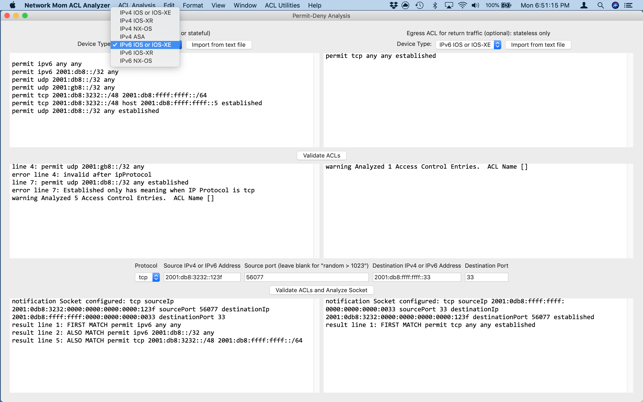價格:免費
更新日期:2019-10-24
檔案大小:4.9 MB
目前版本:2.1
版本需求:macOS 10.14 或以上版本,64 位元處理器
支援語言:英語

"Network Mom ACL Analyzer" analyzes Cisco® IOS®, IOS-XE®, IOS-XR®, NX-OS, and ASA IPv4 and IPv6 access-lists. It also analyzes Arista Networks® EOS® IPv4 and IPv6 access-lists. It identifies many types of syntax errors. It lets you specify a TCP or UDP socket and identifies ACL lines which permit or denies that traffic.
"Network Mom ACL Analyzer" also finds "duplicate" ACL lines. A "duplicate" line is when an earlier line in the ACL matches a strict superset of a later line. The later line might be unnecessary, or the earlier line might match more traffic than you anticipated.

Large corporations have access-lists consisting of thousands of entries. An automated tool is necessary to determine whether a particular network socket is already permitted by an ACL. By knowing whether a socket is already permitted, you may avoid adding redundant lines to your network configuration.
If you've already added redundant lines to your configuration, this analyzer can help you identify them.

This ACL analyzer successfully determined whether a 50,000-line IOS access-list permitted a specific tcp/udp socket in under 20 seconds.
Duplicate ACL detection takes longer. The analyzer finds duplicates for a 2,000-line ACL in ten seconds. Duplicates for a 10,000-line ACL takes approximately 25-times longer (several minutes).

Certain types of errors can cause a security incident. IOS ACLs, in particular, are vulnerable to incorrect "do not care bit" misconfigurations. This tool reports discontiguous or incorrectly aligned "do not care bit" configurations as errors.
The analyzer includes support for network object-groups across all Cisco variants. Service/port object-groups are supported in NX-OS and IOS-XR.

To facilitate tool testing, the ACL Analyzer includes utilities to create "random" IPv4 and IPv6 access-lists for each Cisco variant.
To protect the privacy and security of your access-lists, the "Network Mom ACL Analyzer" uses Apple's "app sandbox" feature. This analyzer is not allowed to make or receive network connections. This analyzer is only allowed to read files the user selects. The analyzer is not allowed to write files outside of the application sandbox. This analyzer does not save ACL information between application runs.

Limitations in release version 2.1:
• Does not support service object-groups on IOS, IOS-XE, or ASA platforms.

• Analyzes extended ACLs but not standard ACLs.
• Discontiguous "do-not-care-bit" ACL lines are reported as errors (we consider this a feature and recommend not using discontiguous do-not-care-bits in your ACL configurations).

• Does not perform DNS lookup of hostnames in ACL configurations (required as part of our "no network connections from this tool" security model).
• Does not analyze NAT configurations, dynamic lock-and-key ACLs, VACLs, reflexive ACLs, time-based ACLs, GSR receive access-control lists, CBAC, or access-lists which use keywords for router IP addresses, such as "infrastructure_ips", "bgp_peer", "router_ip", or "interface" (ASA).

• Does not support "common ACLs" on IOS-XR.
• Does not analyze ACLs based on ip precedence, dscp, packet-length, ICMP message-type, or IGMP message-type.
• Only analyzes TCP and UDP sockets to determine whether they are permitted by an ACL.
While Network Mom ACL Analyzer can find many types of syntax errors, it does not claim to be perfect when searching for errors, analyzing sockets against ACLs, or searching for duplicates. Do not base the security of your company solely on the output of this tool. Do not remove a reported duplicate without performing your own technical and security analysis.
Cisco®, IOS®, IOS-XE®, IOS-XR® are registered trademarks of Cisco Systems, Inc. and/or its affiliates in the United States and certain other countries. Arisa Networks® and EOS® are registered trademarks of Arista Networks. Network Mom LLC is not affiliated with Cisco Systems and Arista Networks.
